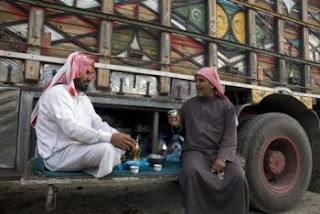
The launch today of
The National newspaper promises good news, especially for Abu Dhabi, the United Arab Emirates and the Arab world. It will give to the capital city a special voice but how different will this newspaper be from the other national newspapers?
Writer as Witness
The recently highlighted censorship in Myanmar and China has underscored the downside of a heavy government control of the media which prevents its citizens and the world from being aware of protests and the issues about which citizens are taking a stand.
An important role of the media is to inform—to tell people what is going on, to be a witness ‘telling the truth, the whole truth and nothing but the truth’. This doesn’t mean open slather as governments must provide clear safeguards from the harm of violent and hateful barbs.
However, there is a vital role for the media in revealing injustice, poverty, discrimination and duplicity even when this may not reflect well on the government, its people and its culture. This involves being a conscience to society and a prophetic voice that explodes the myths and strips back the veneer.
Newspaper as Majlis
At the heart of Arab culture is the majlis where people sit at the same level to entertain, to ask questions and to tell stories. The word ‘
majlis’ comes from the verb ‘to sit’ and sitting is one of the favorite pastimes of Emiratis.
The majlis is a cultural contribution to a world that has lost the art of conversation and has become adept at hurling explosive statements at each other. Nowhere has this been more pronounced than in the sphere of religion where the language of blame and confrontation reigns.
The best journalists are storytellers and a newspaper is vibrant when it serves as a majlis through which its readers can also tell their stories, ask questions and debate in a climate of tolerance and understanding.
Journalist as Jester
In some countries down through the centuries, the rulers have had jesters whose task is to amuse but sometimes to say to the King, ‘You may be wrong.’ Some effective CEOs have appointed a person to be the
‘corporate jester’ who will ask the hard and necessary questions of the board and its management.
An effective and robust government will see journalists as jesters, who with wit and sometimes absurdity will raise questions and point up policies and practices for reform. In a country where there is no voting by the people, no party system and no fully elected politicians, it is important to remember that leaders do not have a monopoly on wisdom and journalists should be encouraged to be their jesters—not defaming those in public office but serving as the respectful opposition.
The UAE was established with
publishing laws that prohibit the media from saying anything critical about its ‘President, rulers of the emirates and leaders of Arab states and other friendly nations’ (the law allows for criticism of unfriendly nations but doesn’t specify who they are!)
There are indications that the media climate is changing with the recent formulation of a
UAE Code of Journalistic Ethics and the welcome decision to abandon the
imprisonment penalty for writers in the Emirates. However, recent (February 2008)
threats by the Arab League to collectively curtail press freedom are disappointing and this illustrates why the UAE and other Arab nations have a long way to go before they are ranked highly in
press freedom (the UAE has improved but it is still 65th in the world). Unfortunately, the bonds and boundaries between the UAE government and journalists in the Emirates are as clear and as safe as an Abu Dhabi fog.
Mirror and Goad
It will be fascinating to see how much freedom
The National takes and how much it is given. In one of his
first statements as the editor of
The National, Martin Newland is quoted as pondering, “Will I have problems with censorship? To be honest, I don’t know and I suppose I’ll be finding out.” Such murkiness points up the need for an ongoing clarification about the role of a UAE newspaper and the responsibilities of its journalists.
In the same speech at the newspaper’s launch, Newland adopted a cautious approach when he said that
The National would strive “to promote the local culture rather than challenge it.” When he added that, “The role of
The National is to reflect society,” it seemed that the new paper would be seeking to be more of a mirror than a goad.
If Newland’s 200 journalists can sensitively draw back the veil from Emirati society and allow its citizens and the interested world to see what is truly happening behind the walls and tinted windows then
The National will be a newspaper worth reading.
Dr. Geoff Pound
Image:
The National hot off the press and so is
The National web site.
 An interview with Kevin Roberts from Saatchi and Saatchi is posted on Arabian Business.Com.
An interview with Kevin Roberts from Saatchi and Saatchi is posted on Arabian Business.Com.













